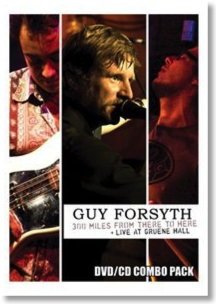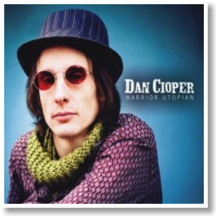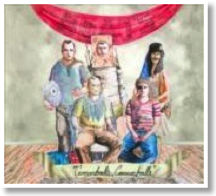May 2011
300 Miles from There to Here & Live At Gruene Hall

300 Miles from There to Here & Live At Gruene Hall
Small & Nimble Records
The guitarist-singer-songwriter-label owner Guy Forsyth has found popularity as an important Texas musician through his Austin-based progressive folk outfit Asylum Street Spankers and as an Americana-influenced blues rocker with his self-titled band in the 1990s. His disparate performances have earned him musical success, including the Austin Music Award for Best Male Vocalist in 2005 and an exceptional Billboard Blues Album Top 10 hit with Love Songs: For and Against.
To celebrate Forsyth’s reputation as an accomplished guitarist and adept singer, Small & Nimble Records released a CD/DVD combination featuring two of his live performances.
In the town of Gruene, Texas (now a part of New Braunfels), Guy and the gang graced Gruene Hall’s historic concert stage that has featured the likes of George Strait, Gregg Allman, and Willie Nelson. The CD Live At Gruene Hall opens with the spoken word introductory of “Taxi” before the song breaks into a bold blues wash. “Telephone Line” gives off a Hawaiian-tinged blues vibe, rollicking rock permeates the ode to the city of Brownsville, Texas, and Forsyth travels country terrain with “Econoline.” Even the standards “Hard Pushin’ Papa” and Bo Diddley’s chugging “Mona” are given sincere renditions.
The DVD portion 300 Miles from There to Here, filmed at the Waco Cultural Arts Festival, is initiated by the rural blues of “105,” fronted by Forsyth’s hoarse harmonica. Again, to demonstrate diversity, the following track “Adam’s Rib” reminds one of Dixieland jazz with Forsyth’s scatting and William Landin’s steady tuba. A weepy singing saw and gruff vocals pierce their ghost-like take on the George Gershwin evergreen “Summertime,” and for the next round, ukulele and finger clicks inform “Mary Mae.” Even the iconic blues musician Son House is given a tribute under the title “Son’s House,” which Forsyth reminds made a discernable impact on generations of blues guitarists ranging from the fabled Robert Johnson to Forsyth himself.
Seeing and hearing Guy Forsyth is like viewing different personalities in one person, sometimes with abrupt changes. His performances may be jarring and inconsistent for some, but that’s the point Forsyth wants to get across: “American music is a really long story…an ever-moving, constantly flowing river,” states Forsyth, and he channels its energy and heterogeneous history in these two performance treats with its different flavors and variations.
by Jeff Boyce
Warrior Utopian

Warrior Utopian
Independent Release
Texas native Dan Cioper has been making music in the Austin area for the past nine years after his childhood in Minnesota. Warrior Utopian is Cioper’s first full length album since the death of his wife two years ago, and the eleven tracks all carry emotion stemming from the event, as well as the political criticism and activism that Cioper has been known for. The wide emotional scope of the album is mirrored in its full instrumentation, involving a number of fellow Austin area musicians, including producer Courtney Audain and others.
The opening track, “Billionaire Mother Theresas,” is simple in arrangement compared to the rest of the album and features a singing guitar. “Whole Lotta Wakin’ Up to Do” goes bluesy and continues the activist overtones taken in the previous track, with a whispered call to action, followed by a gospel breakdown towards the end. Warrior Utopian boasts two brass-sprinkled reggae tracks, “Satan on the Street” and “My Salvation,” on either side of “Coming Up,” a slower tune that utilizes strings, vocal harmonies, and a harmonica solo. Here Cioper sings about his “degree in kicking ass” and the need to stand tall and proud for yourself even when it’s the hardest thing to do.
“Madly Falling” is in true ballad form and extensive flute work plays around Cioper’s plaintive cries about the moment of realization of love. “I’m falling madly in love with you,” he croons, “I can feel it in my spine.” Title track “Warrior Utopians” is an anthem criticizing modern life and the evils of contemporary American society. This call for revolution features fiddle, guitars, cowbell, and intense emotional investment. With a slower pace, “Endlessly in the Sea” opens on a harmonica solo and Cioper’s high, soft vocals make it clear that he has “thorny tears” to be rid of. They’re also happy tears, however, as the song is about the perfection of a moment and the transformative power of love.
The entire album has religious undertones and makes frequent note of the power of prayer. “Man in Rags” is no different, and speaks of figures and parables from the Bible. It’s not as tight of a package as the other tracks, but the bells, harmonica, and background vocals keep it interesting. “Outlaw Songs” and “Drug Dealer” both call out the seemingly apathetic parties of American life, namely the government and the public at large. The style within each of the two songs varies from country to hard rock, with a strong blast of Middle Eastern flavor in parts of “Drug Dealer,” which neatly takes a narrative seeming to be about drug dealers and which in fact is a criticism of governmental healthcare restrictions, nicely carrying through the album’s loose, spiritual, and activist tone to the very end.
by Marie Meyers
Cannonballs, Cannonballs

Cannonballs, Cannonballs
Kill Rock Stars
Sprightly instrumentation, catchy hooks, strangely silly lead vocals, and a title like Cannonballs, Cannonballs initially give the impression of an aural cartoon circus. For Boats, a Canadian band from Winnipeg, Manitoba, however, there is more than meets the ear. Threading the almost-helium-induced vocals and quirky aura is a sound influence of energetic new wave and incessant indie rock with folk and pop subtleties. The lyrics, which are provided in the CD booklet, reveal dream-like, abstract thoughts. Musically, take “Summercamp Vs. The Fake Moustache,” for instance, which is dressed in ‘80s synth sing-a-long and compare this to the steady, more mature indie rocker “Our Athletic Friends.” Lyrically, “Chrome Eyelids” has a sense of doom, and “Movie Scores; We Hummed” features ambiguous lines such as: “Just then a billion Chinese people jump out of their chairs/Break the morning silence with the sound of rattling cutlery drawers/And you could let your brain spit at your mouth/Or take refuge in this collapsing house.” The vocals are androgynously high-pitched (think of Prince’s “Camille” alter-ego without the eroticism).
Dive in deeper and you might be surprised that Mat Klachefsky (guitar, vocals), Mark Schram (guitar), Ashley Roch (keyboards, trumpet), Luke Bergen (drums), and Louis Levesque-Cote (bass) are signed to the notable Kill Rock Stars label, an underground-based imprint that boasts or once boasted Deerhoof, The Decemberists, Elliot Smith, and significant “riot grrrl” groups Bikini Kill and Bratmobile.
There is a playful tunefulness, humor, and amateurish quality to Cannonballs, Cannonballs that will appeal to adolescents, but what saves it from what some may consider children’s theme songs are the sometimes odd lyrics and nods to new wave and indie pop. Think of Boats as a male-fronted buoyant blend of B-52s, the Warner Bros. animated series Looney Tunes, Arcade Fire, Modest Mouse, and Cyndi Lauper, and that’s what Cannonballs, Cannonballs will deliver.
by Jeff Boyce
Highway Collection

Highway Collection
Lovers Label
The Georgia-based band Lovett is fronted by popular musical score composer and producer Ben Lovett (Last Goodbye, The Last Lullaby). Their debut album is an exploration influenced by soul-searching and spontaneity. It took visits to different geographical locations, namely the United States and Europe.
First track “Fear” gradually builds with a busy undercurrent and then widens into a sing-along anthem with declamatory youthful voices that may remind some musically of John Lennon’s “Instant Karma” and Pink Floyd’s “Another Brick In the Wall Part II.” The lyrical message --“The fear we sustain/With a thousand different names/Comes from the same place…So when will you decide to finally embrace what beauty does not hide” - - is bolstered by the voices chiming “we are not alone” towards the song’s conclusion. As the album advances, the rhythm and instrumentation intensify, especially in the throbbing “Heartattack.” But by the time the Tom Petty-inflected “Black Curtain” falls, the groove steadies. Still, there is variance: “Two Lovers” affects a defeated, languid vocal and dragging rhythm while “Same Old Song” mines Beatles/Monkees nostalgia. The experimental “Eye of the Storm,” with its thunder effects and brief stabs of brooding seagull calls, is carried forward by a backing that increases like the formation process of a tropical cyclone or ominous waves threatening to invade inland. “Ghost of Old Highways,” on the other hand, evokes the upbeat energy of country & western saloons with rocking boogie piano and joyous hand claps.
Lovett’s Highway Collection effectively pushes its theme of exploration forward “Like a Moving Train,” a mellifluous track that channels through reflective-acoustic territory: “So when that train comes around/Might pick you up or run you down… I had to find myself a better way/Every other place I could not stay/Just slipped away/Like a moving train.” We may get lost, we might get sidetracked or derailed, but the wheels of life keep rolling and at some point a destination is reached. Within this context, the overlying message of the album reaches a destination but the music will continue its progress, picking up new listeners along the way.
by Jeff Boyce


